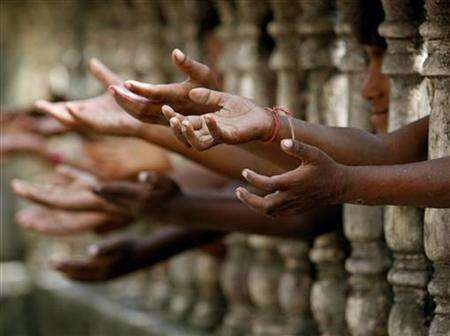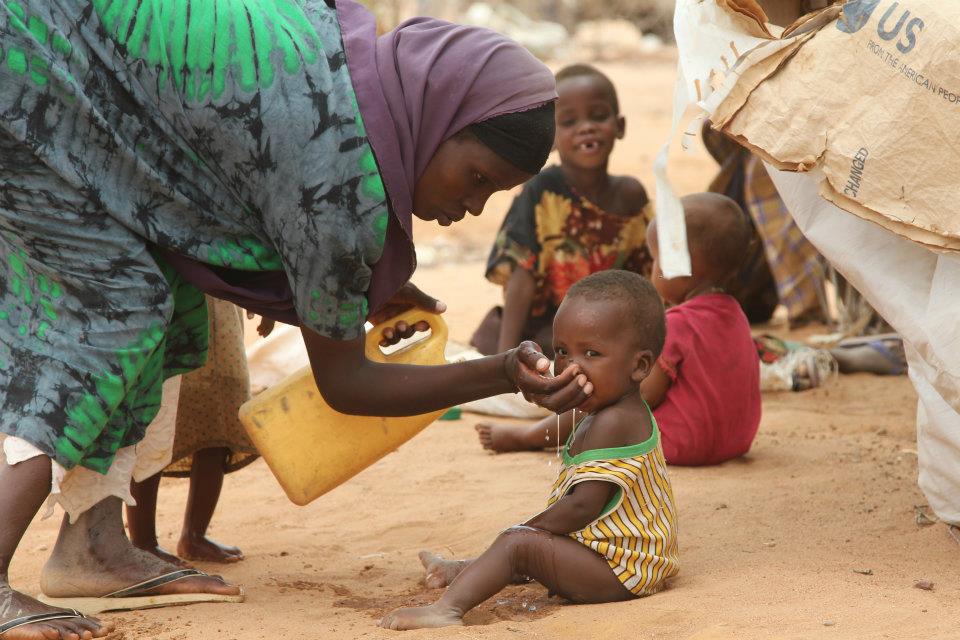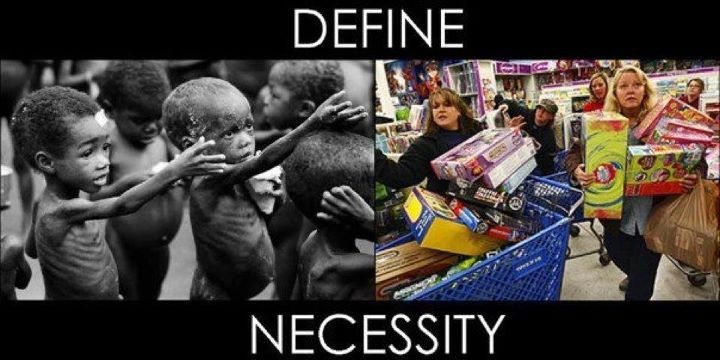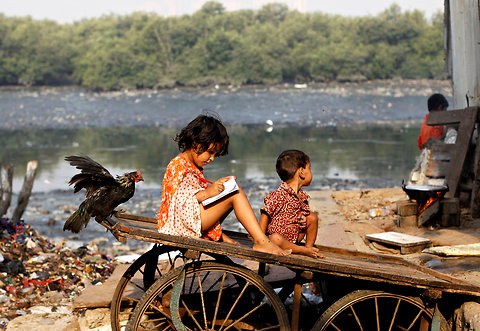GIVE: Yourself.
“Jesus said, ‘When you give a luncheon or dinner, do not invite your friends, your brothers or relatives, or your rich neighbors; if you do, they may invite you back and so you will repaid. But when you give a banquet, invite the poor, the crippled, the lame, the blind.'” (Luke 14:12-13)
~
“The most terrible poverty is loneliness.”
—Mother Teresa
Here is our (my) tendency: We want to give. We want to support good causes. We want to feel good about giving. But we also want “the good life” and we want to climb the social ladder and keep company with those who have the most desirable qualities—the educated, those with great personalities, those who live like us. We want our children to go to the best schools. We want to live in the nice neighborhood.
Or, if I want to be really embarrassingly honest: We want to give to the poor but we don’t want to look like them or dress like them.
We want to make sure the lines and distinctions are clear:
We’re helping them, we’re not one of them.
Ouch. Anybody else?
Jeff and I have been slowly wrestling through this. We live in a culture where social status is huge—it’s very popular to give to charitable causes, but it’s also very popular to be popular.
Here’s the thing: this week we discussed how the best place we can spend our American dollars is on giving overseas, to actually saving lives, alleviating absolute poverty, and spreading God’s word to corners of the globe that have never heard the truth. But what about here? How can we bless the poor here?
By inviting them to dinner.
By living by them. By being with them. By hanging out with them. In Total Church, a mother in the UK described her experience of poverty like this:
“In part it is about having no money, but there is more to poverty than that. It is about being isolated, unsupported, uneducated, and unwanted. Poor people want to be included, not just judged and ‘rescued’ at times of crisis.” (79)
As long as we are concerned with maintaining distinctions and lines of social status, we will never truly love the poor. We might give a lot of money away. We might become great advocates for them. But as long as we think of ourselves as separate from them, we will never truly identify with them in such a way that they are included, welcomed, embraced.
In order to give our money away, we need to grow in humility. We must recognize that we are not the most important people on the planet, and that others are actually worth us giving our resources.
But the next step of growing in humility is being willing to not just help them, but include them, invite them over.
Become one of them.
Isn’t that what Jesus did for us? Jesus could have easily sent down a “rescue mission” from heaven but remained separate from us. He could have done some cosmic substitution and taken away our sin by revealing Himself in some spiritual form and having us believe in Him in that way.
But He didn’t.
Jesus moved into our neighborhood. He became poor. He gave away all His status, glory, rights, privileges, preferences, in order to live as the poorest person, to become one of us. He humbled Himself beyond what we could even imagine. The God of the universe becoming a eating, drinking, sweating man with regular bodily functions, desires, weaknesses. He blended in. He didn’t walk around like a hero, wearing a crown and stooping down only long enough to give us a hand-out. He moved into our neighborhood and became one of us.
Perhaps, then, we could go without the latest style of clothes or live in a less desirable neighborhood?
Perhaps in order to maximize the effectiveness of ALL our resources (time, finances) it makes sense to give the priority of our finances to those in absolute poverty overseas or those who have never heard the gospel, while giving the priority of our relationships to the poor right here in our cities.
Again, it’s great if you can go befriend people in Asia, or if you give money to local causes. But for ordinary Mr. & Mrs. Jones who are just trying to make best use of their limited resources, consider giving more money overseas and giving more time to the actual people who live in our cities and communities. Invite them to dinner. Re-read Jesus’ words at the top of this page and Mother Teresa’s words and ask Him what that means for you …
{Thank you for traveling this road with me, learning and growing. We still have so far to go, but grateful to God for His patience. I’d love to hear your thoughts on the ideas presented this week… Will you share? Thanks so much for sharing. Have a great weekend.}
GIVE: To those who ask?
“Jesus said if someone asks, we should give…”
From a Christian perspective, shouldn’t Jesus’s mandate to give to those who ask, compel us to give to those around us who are asking? We are frequently exposed to the local needs and even panhandlers, who are directly asking us to help them. However, the needs of the poorest of the world have been made known to you as well.
Do we believe Jesus’s mandate only applies to those who directly ask in person? This leads to an absurd conclusion: only those that have the ability to come in contact with the wealthy should have the priviledge of benefitting from their generosity. Should Africans be denied our generosity because they can’t afford to travel to our highways and put cardboard signs asking for money? The reality is that we live in globalized society, and the needs of the world have been made known to us. Jesus is telling us to meet the needs that are made known, not give prioritization to those who are able to deliver the request in person. And this mandate is not just here, the core of Jesus’s message is about meeting the needs of this world
“But we can give to both, I am in favor of all these charitable causes”
Prioritization questions are often the most difficult and frequently avoided. It seems like we are often quick to offer an answer to black and white, right/wrong questions. But when faced with choosing between multiple good alternatives, we usually default to politically correct rhetoric, avoiding any commitment. Unevitably such decisions must be made when it comes down to writing a check, but the lack of well-reasoned dialogue about prioritization means that are decisions are often poorly informed, misguided, and based on nothing but any residual emotionals we feel at the moment. We can do better.
Sure, it would be great if we didn’t have to choose. And if you have a couple trillion dollars to blow, then I guess you wouldn’t, but once again, we have limited resources. Lets use them wisely.
“Handouts just keep people in poverty, they don’t really fix the situation”
It is definitely true that finances can be used poorly overseas and even make situations worse. However, most credible charities have decades of experience in understanding how to really deal with problems instead of just providing handouts. These are experts, they know the store of teaching a man to fish inside and out. But teaching a man to fish still takes resources and money.
“You’re being totally naive, you can’t just boil these complex issues down to monetary figures”
Yes, you are absolute right. It is true the poverty is actually caused by a complex web of corruption, resource mis-allocation, education shortcomings, brain drain, disease, and much more, more than just resource scarcity. And there are tredemendous local charities that are doing excellent, critical work here in America, than can’t be discounted just because they aren’t constantly facing starving children and can’t extend their dollar as far as workers in third-world country. I am not writing this to try to get you to stop giving domestically (well, I wouldn’t mind if you stopping giving to panhandlers).
However, I present these arguments because I believe that we are truly out of balance in our giving. There is always a tendency to give more to the needs that are closest, but we need to be resolute in considering the needs of those far from us. And I don’t think we are in any danger of giving too much overseas. Even if half of our giving went overseas to meet the needs of the vast majority of the suffering world, we still wouldn’t be overdoing it, and with our current level of less than 10%, giving more internationally will never be likely to put us out of balance.
Consider these needs of the truly poor abroad and the remarkable power you have to alleviate suffering as you evaluate your finances.
{Thanks so much, Kris, for sharing your thoughts with us on this. Tomorrow I’ll share what the Lord has personally been challenging me with, in regards to giving. Thanks so much for reading and considering these issues. Bless you!}
GIVE: Bang for your buck
Continued from yesterday’s guest post…
I want to consider a few objections to international giving:
1. “But we have poor right here in America”
When we refer to the “poor” in America, this is generally a form of relative poverty, rather than absolute poverty. Relative poverty means that you have less than those around you (perhaps embarrasing, but not usually life threatening). As I mentioned before, there is so much freely available commodities in america (free water at drinking fountains, free bathrooms, freed food at various missions, and even legitimate food in dumpsters), it is almost unrealistic to even classify anyone as living in absolute poverty in America.
Now there are real problems of hunger in America. It would be naive to consider the UN poverty level of $1.25 a day as appropriate across all countries. Basic necessities are simply much costlier in America. People really are in need here, that can’t be denied, but when faced with the comparison of needs, the reality is that poverty we see in America is not commiserate with the poverty in the third world counties.
The higher monetary levels of food and trading in America leads to another important consideration: Not only do the poorest of the world live outside the US, but due to exchange rates and currency inequalities, we actually have far greater purchasing power of relief and development supplies overseas than we do here.
The US dollar can buy vastly more food in Africa and southern Asia than it can in the US. Given the option between spending your dollar to feed ten people vs feeding one person, why aren’t we choosing the former?
This is a serious question that deserves real consideration. Why does someone choose to meet the needs of someone who is close in proximity when the same funds can serve the needs of many that are further away? It seems the most noble answer would simply be ignorance and lack of consideration or apathy. A far more frightening and disturbing possibility is that we actually consider the life of an American worth more than the lives of a several from other countries. Could we really be following such a sick and detestable form of racism, dressed up in nationalistic pride or worse, religious-based supremacy?
Could we really be claiming that American lives are worth more than foreigners? It seems there are immigration and international affair decisions that suggest that we do.
This inequality is taken for granted in journalism; the death of one American is considered to be equivalent to the death of 10 Europeans or 100 Africans in terms of newsworthiness. It is one thing to apply this concept to printing newspaper, it is far more troubling when this dictates who gets the basic essentials for survival.
{Challenged with you… thanks so much for considering these things. More tomorrow…}
GIVE: Where?
“And let our people learn to devote themselves to good works, so as to help cases of urgent need, and not be unfruitful.”
Titus 3:14
I recently received this email from a reader:
Every day, I get donation requests from several ministries/missions – each seems like a great cause. The problem is, how to pick which to give to and how much??? After every “pay day”, I sit here, going through/praying through my stack of letters trying to figure out how God would have me stewart finances toward these.
I believe that as we submit every dollar to God in prayer He will make it clear where He wants His resources to go, but may I also share a 3-part guest post from my brother, a godly elder and man passionate for God’s glory and for helping people:
About 1.7 billion people live in absolute Poverty.
Poverty is the inability to meet basic human needs, such as clean water, nutrition, health care, education, clothing and shelter due to insufficient finances. The United Nations defines poverty as living on less $1.25 (US Dollars) per day (less than $465 per year). About 18 million per year (a third of the deaths in the world) are a result of poverty-related causes. But the real tragedy is the fact that this continues when there are abundant resources to alleviate this suffering. There are plenty of disturbing comparisons of the relative ease with which we bring relief compared to the things which we spend money on here in the states.
For example, the most extreme poverty in the world could be eliminated with the amount we spend on ice cream in America, and the cost to bring clean drinking water to most of the worlds poor is less than we spend on our pets in America.
America gives about 0.1% of US GNP to overseas relief, making it one of the least generous developed countries on the planet. The United Nations has long had a goal of 0.7% of Gross Domestic Product, although in 2005 they dropped this to 0.5% since only four countries were achieving the goal (and America obviously wasn’t even close).
Of course these statistics are nothing new, but I wanted to share them as a defense of international giving as a priority over domestic charitable causes. Currently the charitable donations in the US total about $250-300 billion per year. Less than 10% of that goes internationally (and about 20% of that goes to military funding). However, basically all of those living in absolute poverty are outside of America. America doesn’t even keep statistics on UN defined absolute
poverty because the UN poverty line is so far below the lowest income levels and freely accesible resources. It is difficult to avoid even tripping over $1.25 worth of commodities in a day in America. If the overwhelming majority of the needs are overseas, why does international giving comprise such a small part of our giving?
To be clear, I am not suggesting that it is wrong to give domestically. I certainly wouldn’t discourage local giving. But everyone of us are people of limited resources. We can only give so much.
If the purpose of your giving is just to satisfy some religious obligation or clear your conscience, than I guess it doesn’t matter where you give it. If the purpose of your giving is to make a real tangible difference in people’s lives, why not look for how your monies can make the biggest impact for those that need it most?
FAQs tomorrow. Thanks for reading!
GIVE: hope to little girls
School has started!
This morning I sat on my couch, snuggled next to Dutch & Heidi, and did another lesson from Teach Your Child to Read in 100 Easy Lessons. What a great resource! Dutch mostly has the hang of reading, but now Heidi is picking up on the letters, sounds, and sight-words as she follows along with Dutch. I love seeing how much more quickly she’ll will be able to read since she has the privilege of sitting through all of Dutch’s lessons!
This past weekend I joined women from the south Portland area for a women’s retreat, where I had the joy of teaching God’s Word. I’ve spent the past few weeks poring over scripture. Writing it out, copying it, praying over it, studying it. It still amazes me the power of God’s pure word.
Today I kept thinking, How different would my life be if I couldn’t read? What if I couldn’t teach my children? Couldn’t go out in the world and read signs, warnings, sale ads? What if I couldn’t read God’s Word? What if I had no written intake whatsoever to encourage me, instruct me, empower me?
Of course here in the U.S. that’s unthinkable. We have a 99% literacy rate. But in developing countries many women (more than 33% in Asia) can’t read and have no resources to learn. This lack of education not only prevents them from reading and understanding God’s Word, it keeps them bound in poverty, making them especially susceptible to sex-trafficking. In Half the Sky, (PLEASE read!) the authors discovered that one of the most powerful ways to prevent girls from being sold into slavery was to provide them education. Going into brothels and “freeing” girls was only a temporary fix. Without education and opportunity, they would often willingly go back to the life of slavery, since they had no other options. Educating girls proved both to prevent girls from ending up in slavery and helped keep them out, once freed.
Is education an absolute essential? No. Of course providing clean water, shelter, food, and medicine will always be a great route when deciding where you give overseas. But by teaching girls to read we’re giving them not just a hand out but a hand up, the ability to escape the bondage of poverty and victimization and help other women do the same.
I guess the best thing to ask is: To what lengths am I willing to go to ensure my own kids get the very best education and step-up in this world? I know I would go to crazy lengths, and am committed to their education even though it costs us significant time and money.
Could we do the same for them, just a bit? They are God’s beautiful daughters, just as ours are. Just as I get so excited to see Heidi grow and learn and be a strong, smart, capable, bright little girl, I pray God helps us care and genuinely love these precious girls who–with our help–can escape sex-slavery and grow to know, love, and follow Him.
So as you help your little ones learn this year, would you consider giving a gift so other little girls can read as well? GFA has some awesome literacy programs, you can read, watch and donate HERE. Perhaps you might just take the cost of one book that you might buy ($10) and donate that toward teaching little girls to read.
Would you pray about this today? Thanks so much for taking the time to extend your gaze beyond your walls and consider how you can bless these little girls God loves! Have a blessed Monday… Thanks for reading!
#31 GIVE {52 bites}
When tragedy strikes, it’s amazing all the things we don’t care about anymore.
Every time I read my friend Shawna’s blog, I am reminded of what really matters. I’m reminded that a spotless kitchen isn’t that big of a deal. That even if there are crumbs in my car, life will go on. That if I never fit into my favorite skinny jeans, who cares?! That if my food isn’t organic or even if it comes from more than 150 miles away sometimes (just sometimes!), it really will be ok. I’m smiling, I promise. I just mean that facing life and death issues makes everything else fade away a little bit, huh?
That’s what I’ve been experiencing lately. Not that we’re facing any tragedy, but as we’re pouring our hearts into this church plant, into really praying and seeking God for the people of south Portland to be freed from the slavery of sin and to be set free to know and follow the Good King Jesus, it’s amazing what doesn’t seem to matter anymore.
So as I look through the list of 52 bites I’m having a hard time getting motivated to chew any more. They are great things, don’t get me wrong (and I love Tsh Oxenreider!), but of all the ones that are left, that we haven’t tackled yet, only one really stands out to me:
#31. Give.
We could take this bite every day for the rest of the year and still just barely whet our appetites for how wonderful giving truly is. So, next week we’re going to devote our entire week to thoughts and discussions on giving. Please join us, and spread the word! Jesus said it is more blessed to give than to receive. So let’s grow in giving … and in being blessed.
For now, spend some time praying that God would prepare your heart to grow in this area–that you would give regularly, generously, and cheerfully. That He would prepare you and me and open your eyes to areas He wants us to share. It might not just be finances, but also your time, your words, your skills. Then, take a leap of faith and give something this weekend. We were showered this week by generous givers–from taking our kids for a few hours so we could have a date, to an afternoon boat ride, to fresh produce, to loads of leftover yummy food, to a food dehydrator, to a free tank of gas. The giving thing is fun but the receiving part is fun too! 🙂
Lastly, would you give me your prayers? I am teaching a women’s retreat this weekend and would so appreciate your prayer! Thank you so much for journeying along with me, caring and giving your time and energy to growing alongside. Have a blessed weekend and thanks for reading!








